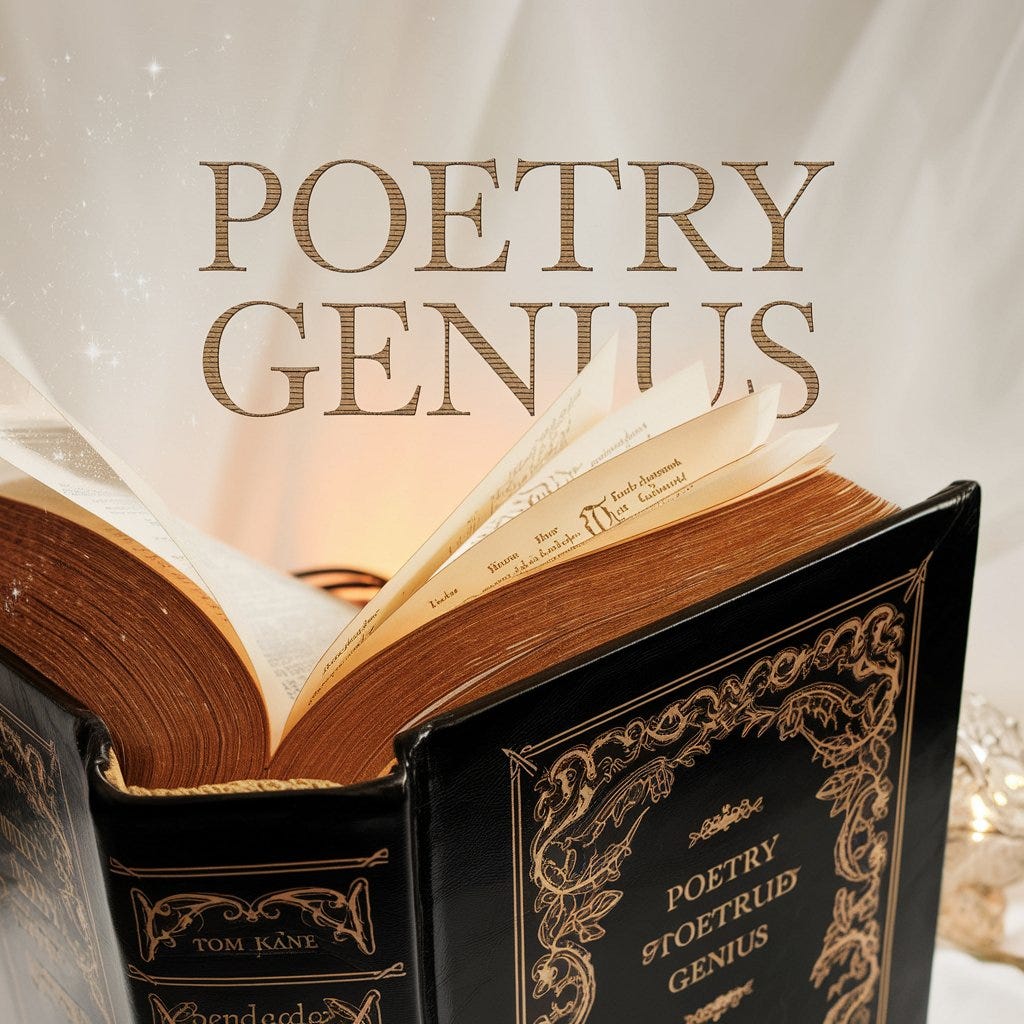POETRY HIDING IN PLAIN SIGHT: TURN YOUR EVERYDAY 'BLAH' INTO POETIC 'AHA!'
Why your boring life is actually a goldmine of poetic material
"I don't have anything interesting to write about."
I hear this from poets constantly, usually followed by some variation of "My life is too ordinary" or "Nothing dramatic ever happens to me" or "I'm not like those poets who've traveled the world and had fascinating experiences."
Here's what I want to tell every poet who thinks their life is too boring for poetry: you're looking in the wrong direction. Poetry isn't hiding in exotic locations or dramatic events. It's sitting right there in your kitchen, in the way morning light hits your coffee cup, in the rhythm of your neighbor's footsteps upstairs, in the specific weight of your keys in your pocket.
The most powerful poems often emerge from the most ordinary moments—but only if you know how to look.
THE MYTH OF THE EXTRAORDINARY LIFE
We've been conditioned to think poetry requires Big Experiences: heartbreak, travel, trauma, spiritual revelations, encounters with wild animals or famous people. This is partly because dramatic events make for easy poems, the material seems to organize itself.
But here's what that thinking misses: the extraordinary is often hiding inside the ordinary, waiting for someone with the right kind of attention to notice it.
Consider William Carlos Williams' red wheelbarrow, or Frank O'Hara's lunch poems, or Kay Ryan's observations about everyday objects. These poets didn't live more interesting lives, they paid more interesting attention to the lives they had.
DEVELOPING YOUR POETIC GAZE
The difference between poets and non-poets isn't experience—it's the quality of attention. Poets notice things that others let slide by. They see the strangeness in familiar routines, the metaphors hiding in mundane objects, the stories embedded in everyday encounters.
This isn't a talent you're born with or without. It's a skill you can develop through practice.
THE ART OF CLOSE OBSERVATION
Start with the micro-level. Instead of trying to capture your entire morning routine, focus on one tiny element: the sound your coffee maker makes as it finishes brewing. The exact color of steam rising from your shower. The way your cat looks at you when you're running late.
Specific beats general every time. Instead of "the traffic was bad," try "three lanes of brake lights like a necklace of red pearls stretching toward the horizon." Instead of "my grandmother was old," try "her hands moved like careful birds arranging the pills in her weekly dispenser."
The more specifically you observe, the more universal your observations become. Readers may not share your exact experience, but they recognize the quality of attention you're bringing to it.
MAKING THE FAMILIAR STRANGE
One of poetry's superpowers is defamiliarization, helping readers see common things as if for the first time. This doesn't require exotic subject matter; it requires a shift in perspective.
Try writing about familiar objects from unfamiliar angles:
Describe your toothbrush from the perspective of your mouth
Write about your car keys as if you're an archaeologist from the future
Observe your reflection in different surfaces throughout the day and notice how each one tells a different story
Pay attention to moments of slight disorientation: when you wake up in an unfamiliar room, when you see your own city from a new angle, when automatic routines get disrupted. These moments of cognitive static often contain poetic gold.
THE POETRY OF WAITING AND TRANSITION
Some of the richest poetic material happens in the spaces between events: waiting for the bus, standing in line at the grocery store, the five minutes before you fall asleep, the moment between finishing one task and starting another.
These transition moments are when our minds often make unexpected connections, when we notice things we usually miss, when the ordinary world reveals its hidden strangeness.
FOUND POETRY IN OVERHEARD CONVERSATIONS
Start paying attention to fragments of conversation you overhear in public spaces. Not to eavesdrop invasively, but to notice the poetry that already exists in how people actually talk.
The way a child explains something to a parent, the phone conversation happening at the next table, the argument between strangers on the sidewalk—these contain rhythms, images, and emotional truths that can spark poems.
THE METAPHORICAL POTENTIAL OF OBJECTS
Every object in your environment is a potential metaphor waiting to be discovered. That chipped coffee mug isn't just damaged dishware, it might be a perfect image for endurance, or the beauty of imperfection, or the stories objects accumulate over time.
Practice seeing objects as emotional landscapes: What does your desk drawer reveal about your mental state? What story does your refrigerator tell about your relationship with nurturing? How might your car's behavior mirror your own patterns of reliability or breakdown?
SEASONAL AND WEATHER AWARENESS
You don't need to live somewhere with dramatic seasons to mine weather for poetic material. Notice the micro-changes: how the light shifts throughout a single day, how rain affects the behavior of strangers, how heat or cold changes the rhythm of your neighborhood.
Weather isn't just background, it's a character that influences mood, memory, and behavior in subtle but significant ways.
THE POETRY OF ROUTINE AND RITUAL
Your daily routines aren't boring, they're deeply revealing. The order in which you get dressed, the route you take to work, the way you organize your space, these patterns contain information about who you are and how you move through the world.
Try documenting a single routine with forensic attention: brushing your teeth, making your bed, locking your door. What does this ritual reveal about your relationship with control, comfort, or security?
EXERCISES FOR DEVELOPING EVERYDAY AWARENESS
The Daily Inventory: Each day, write down three things you noticed that you've never noticed before, no matter how small.
The Texture Journal: Focus on physical sensations throughout your day. The temperature of different doorknobs, the texture of various surfaces, the weight of objects in your hands.
The Sound Map: Spend five minutes in any location just listening. Write down every sound you hear, from the obvious to the barely perceptible.
The Stranger's Perspective: Describe your own living space as if you're seeing it for the first time. What would a stranger notice? What stories would they construct?
The Emotional Weather Report: Instead of noting actual weather, track the emotional climate of different spaces throughout your day.
TRANSFORMING OBSERVATION INTO POETRY
Noticing is only the first step. The real magic happens when you transform observation into language that helps others see what you've seen.
Use concrete details to carry abstract emotions. Instead of saying you felt lonely, show us the single place setting on the table, the way echoes sound different in an empty house, the conversation you had with the grocery store clerk that lasted longer than necessary.
Look for the larger implications of small moments. That interaction with the barista might say something about connection in urban spaces. The way you organize your workspace might reveal something about your relationship with control.
PERMISSION TO FIND SIGNIFICANCE ANYWHERE
Here's your official permission: your ordinary life contains enough material for a lifetime of poetry. The challenge isn't finding dramatic subjects, it's learning to see the drama that's already there.
Every moment of your life is unprecedented in human history. No one has ever experienced exactly what you're experiencing, from your precise vantage point, with your particular history and perspective.
That makes even your most ordinary Tuesday morning unique and potentially profound.
Stop waiting for permission to write about your actual life. Stop thinking you need to travel to exotic locations or survive dramatic events to have something worth saying.
Start paying the kind of attention that transforms the everyday into the extraordinary. Your coffee cup, your commute, your conversation with the person at the post office, it's all poetry waiting to be discovered.







Great advice here - just notice what's near you. I wish I did poetry because this post is a goldmine. I have noticed recently that my fly-zip is down a lot... it's as though there is now an interruption when I am dressing and that has to be an age thing... I'd write a poem about that if I was a poet!!!